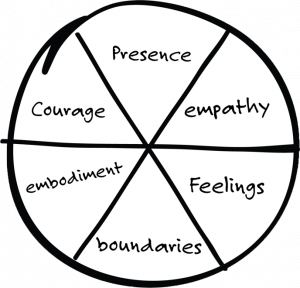The Self as Coach, Self as Leader
As a coach or a leader, we start at home. Understanding our internal landscape is key to strengthening our capacities to build strong relationships that allow us to do our best work. This Self as Coach, Self as leader book focuses on the power of the ‘use of self’ as our most important tool as coach and leader; and the true differentiator in our effectiveness. This work examines the key meta-skills needed to be at our best and delves into the underlying concepts that inform how we develop in our early years and create.
Six Dimensions

The six meta-skills we need to continually hone in our work include the broad area of presence, empathy, range of feelings, boundaries, embodiment and courage. Each of these meta-skills are examined in the brief videos that follow.
Additional Resources
Worksheet Horney's Home Base [PDF]
Worksheet Chapter 2 Review [PDF]
Worksheet 6 Dimensions [PDF]
Worksheet Attachment Theory [PDF]
Presence: Getting Present
Presence is multifaceted and complicated territory for us. First, we need to be present to our inner chatter, our biases and assumptions that impede our capacity to be there for another. Next we benefit when we are alert to what is unique about the 'third entity', the relationship; and finally we always gain a broader context for a situation when we are aware of the ecology that surrounds another and a situation.
Additional Resources
Worksheet Cultivating Full Presence [PDF]
Empathy: Creating Conditions for Breakthrough Moments
Empathy is the glue that makes this highly relational work of coaching and leadership possible. Without sufficient levels of empathyvery little worthwhile work will occur in coaching. The client needs to feel connected and seen by the coach. The coach needs to feel equally connected and it is inside this relational field that meaningful works occurs. We need to perpetually hone our ability to imagine what it would be like to walk in our client’s shoes, to live in our client’s experience.
Additional Resources
Worksheet Walking In a Client's Shoes Without Wearing Them [PDF]
Range of Feelings: Feelings are Human!
Feelings, with their wide range of layers and nuances, are a part of the human condition. When a leader comes to a coach, that person brings all of their self to the work and with this comes feelings. This is not the sole territory of psychotherapy; it is the territory of being human. Often coaches shy away from feelings, worrying this may lead to dark unknown regions of the psyche. Yet, the way in which we reveal and moderate our feelings is core to who we are as human beings.
Additional Resources
Worksheet Building Our Repertoire [PDF]
Boundaries & Systems: The Necessity of Boundaries
What do you know about your own boundary preferences? How much physical space do you like to have around you—your personal space? How clear are you on what you say yes to and what you say no to? When our boundaries are agile, we are at our best; we are able to hear our client’s stories and observe patterns, and to hold a strong alliance while able to surface what we observe instead of getting swept into their situation or story.
Additional Resources
Worksheets Creating Agile Boundaries [PDF]
Additional Resources
Worksheets Finding Our Center [PDF]
Courage: Our Courage Creates an Invitation
Courage grows in the choices we make and the actions we undertake every day in our work. Our willingness to speak our truth, to share an important perspective or observation, to be candid when it matters, or to be provocative in order to help a client gain another perspective—these are acts of courage, demonstrations of going bigger, and signs of resisting the urge to retreat to the shore and avoid the new horizons.
Additional Resources
Worksheet Cultivating Our Courage [PDF]
